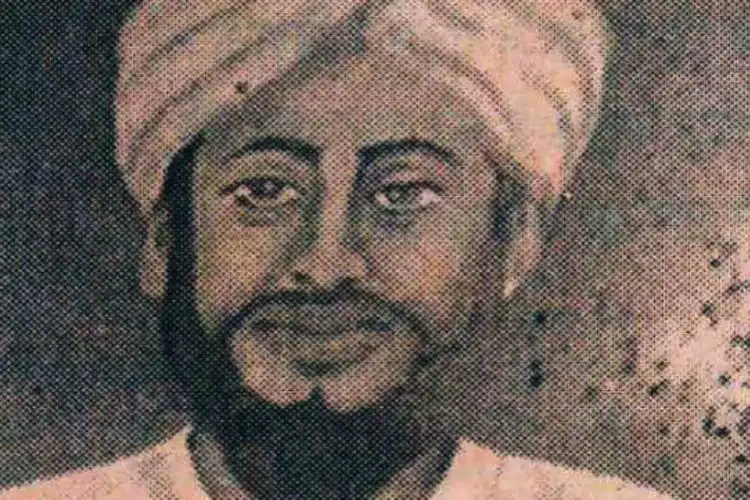
Manjit Thakur / New Delhi
The Chotanagpur area of Jharkhand is the birthplace of a brave Indian Sheikh Bihkhari, who faced atrocities of the British for speaking up for his people, and finally, faced the gallows, and yet he remains unsung in the national narrative or the history books of modern India.
Sheikh Bhikhari's father Sheikh Bulandu was a warrior in the small princely state of Aurgarh. Once the prince of Augarh once insisted on drinking a deer's milk. As per the record in the Tribal Welfare Research Institute of the Jharkhand that Sheikh Bulandu caught a lactating deer for the Prince. The Queen was pleased and gifted 12 villages to Sheikh Bulandu for revenue collection.
He also received a royal sword and turban as a reward. The sword is still available in Jariagarh (Govindpur) and is displayed in a procession on the occasion of Vijayadashami. Sheikh Bhikhari was born in 1819 in village Khudia (Khodaya) located in today’s Ormanjhi police station. He was 38-year-old when the war of freedom broke out in the country in 1857. He was a highly trained and skillful person and was appointed Diwan by Raja Tikait Umrao Singh of Ormanjhi Khatanga. He was also a member of the Muktivahini, a volunteer organization founded by Thakur Vishwanath Shahi of Barkagarh-Hatia that has members from all communities.
The valuor displayed by Raja Umrao Singh, his younger brother Ghansi Singh and their Diwan Sheikh Bhikhari in the revolt of 1857 is folklore in the Ormanjhi area. Jamadar Madhav Singh and Subedar Nadir Ali Khan led the revolt of Doranda's army in Ranchi district on July 31, 1857.
Chutupalu Valley and Ormanjhi were the epicenters of this revolt. Bhikhari, skilled and visionary in military operations, working in close association with Subedar Nadir Ali and Jamadar Madhav Singh. British Captain Graham and his three officers fled towards Hazaribagh and the rebels had captured their guns. It was Sheikh Bhikhari who diverted these guns towards Ranchi. On August 2, 1857, Chutupalu's army established control over the city of Ranchi.
The commissioner of Chotanagpur, E.T. Dalton (Daltonganj city is named after him) District Magistrate Davis, Judge Okas, and Palamu Sub Divisional Officer (SDO) Breach all fled to Bagodar. In this, the British sought help from Sikh soldiers to crush the revolution in Chaibasa and Purulia. Sikh soldiers camped in Hazaribagh from September 2 to September 4. In the meantime, Sheikh Bhikhari reached Hazaribagh and he managed to win over Major Bishan Singh of the Sikh army. This made the Sikhs soldiers join the Indian revolutionaries. Sheikh Bhikhari paved the way for the Santhal rebellion in the Santal Parganas.
In 1855, Sido and Kanhu had raised the banner of revolt against in the Santal Pargana; they were imprisoned in the Central Jail of Hazaribagh. Both of them died in jail. However, according to folklore, on 30 July 1857, the revolutionaries broke the wall of Hazaribagh Jail and set Sido and Kanhu free. Sheikh Bhikhari's role in the rebellion came under the lens after he managed the blockade of Chutupalu Valley.
After this Tikait Umrao Singh and Sheikh Bhikhari became targets of the British. Dalton issued threats to both and they didn’t care about him. On August 10, 1857, both of them along with other revolutionaries marched from Jagdishpur to help Babu Kunwar Singh's friend. The Muktivahini revolutionary squad left from Doranda and reached Charta via Kuru (Kudu) canopy, On 30 September 1857, a squad of 3,000 revolutionaries was camping near Fansihari Talab in the city of Chatra when the British army led by Major English attacked them.
A fierce battle was fought on 2 October. Subedar Jaimangal Pandey and Subedar Nadir Ali Khan led their forces while Sheikh Bhikhari was involved were among the fighters. The one-hour battle led to the victory of the British. The victorious Army hanged 150 revolutionaries the next day. Of them, 77 bodies were buried in a mass grave. Both Jaimangal Pandey and Nadir Ali Khan were hanged on 4 October 1857. Among others, Shaikh Bhikhari had escaped being caught or killed and he continued his campaign. After suppressing the Santal rebellion, Major MacDonald proceeded to the Chattupalu valley to confront Sheikh Bikhari’s army. Sheikh Bhikhari and Tikait Umrao Singh blocked the way for the British army to advance.
They damaged the bridge over the road leading to the valley, cut trees and used them to block the way, and attacked the British from a vantage position. After exhausting all bullets, they started rolling stones from the hilltop on the advancing Army and yet the British reached them through a secret route. British soldiers captured Sheikh Bhikhari and Tikait Umrao Singh and imprisoned them. On 7 January, a court sentenced them to death.
On the day Tikait Umrao Singh and Sheikh Bhikhari were to be hanged people from all over started flocking to the valley of Chuttupalu. This scene frightened the British and McDonald's hanged them on the two branches of the same banyan tree on Morhabadi Tagore Hill on Ranchi-Ormanjhi road.
The banyan tree on which the bodies of the two were hanged to intimidate the revolutionaries is called Fansiari Banyan and the one at Morhabadi is called Phansi Tongri. Though the story of their valour and sacrifice are etched in the memory of locals and their statues at the roundabout of the Ranchi city, Bikhari and Ali remain unknown and unsung in the rest of the country.
